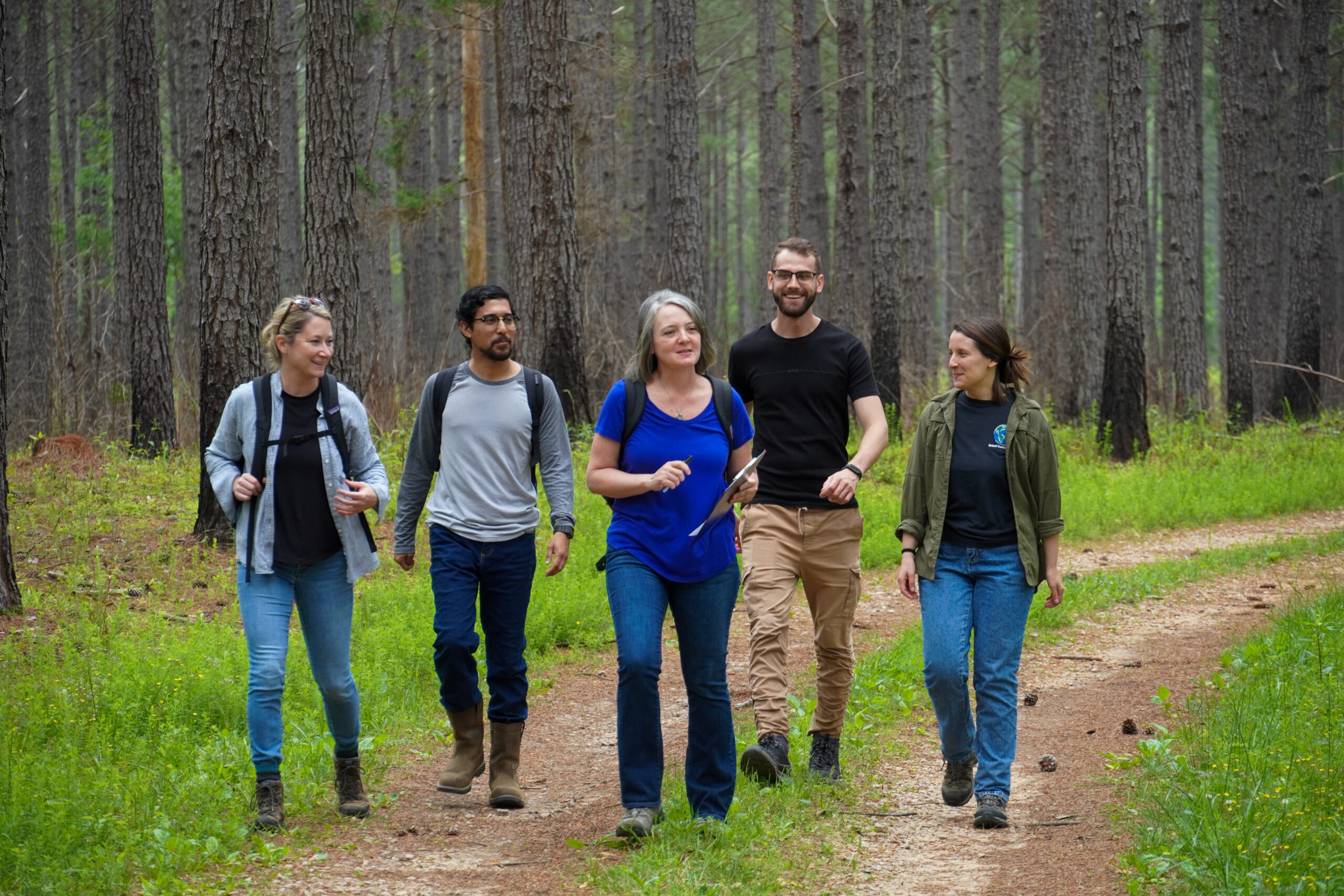
Heather Alexander (center) and her students walk through a fire-maintained forest.
An Auburn University researcher in the College of Forestry, Wildlife and Environment (CFWE) has received a U.S. Forest Service grant to study forest carbon sequestration. The funding will support research to quantify the relationship between forest restoration, carbon storage and wildfire risk in southeastern forests.
Carbon storage within forests has a direct relationship with fire. The more living and dead biomass available on a forest floor, the more likely fire becomes severe and sometimes even out of control — especially if the forest is ignited unintentionally.
Concerns about climate change resulting from reforestation, afforestation, forest conservation and carbon storage are driving this new research. Heather Alexander, the Dwain G. Luce Endowed Associate Professor in the CFWE, and her team will gather data on proper forest restoration and its impacts on wildfire risk and carbon sequestration.
“Most southeastern forests are fire-dependent, requiring periodic, low-intensity fire for their maintenance and perpetuation,” Alexander said. “Decades of intentional fire exclusion, however, has created dense stands with considerable biomass stored in trees, woody debris and organic soils that could pose a risk of severe wildfire.”
Alexander says there is existing research on quantifying carbon storage in trees within southeastern forests. However, the relationship of carbon as it relates to fire in these systems has rarely been a focus, nor has the accounting of carbon stored in non-tree pools like soils. Among decision-makers, the focus on prescribed fire as a tool for forest management and restoration has come into question as being climate-smart, providing the stage for Alexander’s team.

Heather Alexander and her students discuss fire’s role in forests.
The team, including post-doctoral researchers Tamara Milton and Monika Rawat, and co-led by Brice Hanberry of the U.S. Forest Service Rocky Mountain Research Station, plans to study forest carbon pools within understories as well as soils to discover how forest management and restoration will affect carbon storage.
To accomplish their goal, the researchers will perform carbon sampling at field sites across the Southeast, including within longleaf pine, mixed wood and upland oak forests. Some of the sites chosen for the study range from those that have experienced no fire management for multiple decades to sites where tools such as prescribed fire or silvicultural thinnings have been practiced for at least a decade. Carbon measurements will then be compared to evaluate the impact of fire on forest carbon pools.
As an added benefit, Alexander’s team will identify fuel loads as well as other understory characteristics that will be compiled into a flammability trait database. This source can help scientists, landowners and managers assess fire risk.
“The regular use of prescribed fire could prevent forests from over-accumulating live and dead biomass while mitigating wildfire risk,” Alexander said. “It also promotes many of the desired ecosystem services provided by southeastern forests including carbon storage, biodiversity and provision of wildlife habitat.”
The Southeast is also prone to high wind events such as windthrows, tornadoes and hurricanes. Trees are subject to mortality because of these natural events, adding another objective layer to the team’s research. Alexander said their project will factor in carbon implications for wildfire risk at sites affected by significant wind or hurricane damage to provide whole-ecosystem perspectives.
Ultimately, Alexander and her team anticipate the research will have far-reaching implications, providing crucial and necessary data for policymakers to be well-informed about public safety, forest health and climate change for decades to come.









